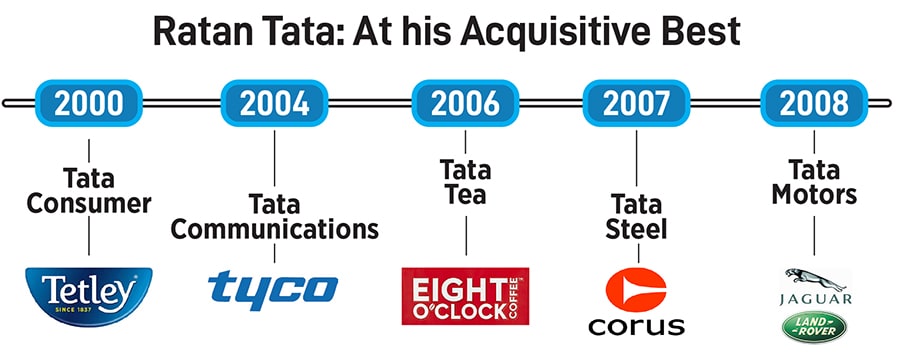 A view of the Tata Steelworks in Scunthorpe, UK. The largest steel making plant in the UK and apparently the largest industrial site in the UK too. Once called British Steel, then Corus and now part of the Tata brand.
A view of the Tata Steelworks in Scunthorpe, UK. The largest steel making plant in the UK and apparently the largest industrial site in the UK too. Once called British Steel, then Corus and now part of the Tata brand.
Image: Paul Simpson/Getty Images
Till the turn of the century, or 132 years after its founding, the Tata Group had remained largely India-focused. With its vast opportunities the country had allowed the group to become a conglomerate with a wide swath of operations—from airlines to steel and chemicals to hotels.
But unbeknownst to most outsiders Ratan Tata, chairman of Tata Sons since 1991, harboured ambitions in the overseas markets. As one group veteran recalled many years earlier, “He had seen TCS and Infosys compete abroad and saw no reason why other companies could not.”
By the late 1990s Tata had consolidated his hold on group companies that were often run as personal fiefdoms. He got rid of the satraps—Russi Mody of Tata Steel, Ajit Kelkar of Indian Hotels and Darbari Seth of Tata Chemicals—by imposing a mandatory retirement age of 75. He also upped Tata Sons’ holdings in their companies. Tata now had both the resources and ambition to go global.
Tata’s first move came with the Tetley acquisition in late 1999. He had lost out on the deal in 1995 when the owners of Tetley, Allied Domecq, had sold the business to a venture capital firm. Writing on LinkedIn Harish Bhat, former brand custodian at Tata Sons who was a junior member of the negotiating team, recalls “…we realised that we had to get our act together on our funding arrangements, if we ever desired to make such a large global acquisition. It was a lesson well learnt.” Four years later the business was on the block again and this time fell into Tata’s lap for the sum of 271 million pounds and the first instance of an Indian consumer brand going global.
Also read: The RNT Legacy: From radios to semiconductors, high technology was his buzzword
While the Tetley acquisition captured the headlines the business proved to be a hard slog. As Tata Consumer Products, where the business is now housed, doesn’t break out financials for Tetley separately it’s unclear whether it ever made money. But there is a substantial goodwill charge (Rs10,334 crore as on March 2024) on Tata Consumer Products’ balance sheet that has dragged down its return on equity. Still, there is no denying the fact that it was Tetley that made Tata a global brand that can be identified and recalled by consumers worldwide.
Undaunted, Tata proved to be at his acquisitive best in the 2000s. Remember, the global economy was booming and M&A activity was high. Tata Motors acquired the Daewoo Trucks business in South Korea, Brunner Mond was brought into the Tata Chemicals fold. Nat Steel In Singapore and Millennium Steel in Thailand became Tata Steel subsidiaries, Eight O’Clock Coffee was bought by Tata Tea and Tyco Global by Tata Communications.
Two deals that brought him into the global limelight came within a year of each other. In 2007, at the peak of the global commodity cycle, Tata Steel entered into a bidding war for European steelmaker Corus Group plc and emerged victorious with a bid that was valued at $12 billion. The acquisition catapulted Tata Steel to the world’s fifth largest steelmaker with a capacity of 27 million tons in 2007. But nearly two decades on, the business has had problems in adapting to the high cost of producing steel in the UK and Netherlands and has had to constantly ask for support from the UK government.

A year later, in 2008, Jaguar Land Rover was up for sale and Tata Motors emerged as an unlikely suitor. Here was an Indian maker of cars and trucks bidding for two global iconic brands owned by Ford Motor Company. Alan Mulally, who had taken over as CEO, was focusing on the One Ford strategy and was keen to get rid of JLR. The acquisition in 2008 was followed by the global financial crisis when both brands saw their sales fall off a cliff.
Post 2010 both Jaguar and Land Rover were huge beneficiaries of a revival in global luxury car sales, particularly in China. The two companies were also known for their precision engineering skills and some of that rubbed off on Tata Motors’ Indian operations. The two businesses were always run separately and such was the success of JLR that Ralf Speth, who led the business till 2016, was appointed on the Tata Sons board along with Bhaskar Bhat of Titan.
By the time Tata retired as Chairman of Tata Sons in 2012 a large portion of the Group’s revenues came from overseas. In a 2004 interview to an internal publication Tata said, “I hope that a hundred years from now we will spread our wings far beyond India, that we will become a global group, operating in many countries, an Indian business conglomerate that is at home in the world, carrying the same sense of trust that we do today.” While there is still a long way to go it’s fair to say the Group is on its way to achieve Tata’s vision.
